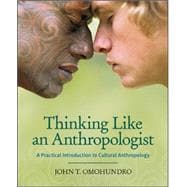
Note: Supplemental materials are not guaranteed with Rental or Used book purchases.
Purchase Benefits
What is included with this book?
| Thinking Like An Anthropologist:A Practical Introduction to Cultural Anthropology John T. Omohundro Suny Distinguished Teaching Professor, Department of Anthropology Suny Potsdam | |
| Table of Contents | |
| List of Figures | |
| Using This Book: The Anthropological Questions Notes and Queries | |
| Notes and Queries | |
| The Anthropological Questions How This Book is Organized Anthropology and the Other Disciplines of Human Behavior What is Cultural Anthropology? The Topics of Cultural Anthropology Why Think Like an Anthropologist? Cultural Anthropology in Careers There's No Substitute for Experience Notes and Queries | |
| Exercise 1: Who Are You? Exercise 2: Where are They? Exercise 3: What You Already Know Recommended Reading | |
| What is Culture? The Conceptual Question 1-1 Fishy Culture | |
| Overview A Definition of Culture Fishy Culture | |
| Culture, Subculture, and Ethnic Group Culture and Race Race as a Cultural Construct The Characteristics of Culture As Cultures Change, "Culture" Changes What Isn't Culture? Summary Fishy Culture | |
| Exercise 1: The Embarrassing Incident Exercise 2: The American Family Exercise 3: Being Multicultural Exercise 4: Race Classification Recommended Reading | |
| How Do I Learn About Culture? The Naturalistic Question 2-1 Heavy Meddle | |
| Overview Heavy Meddle | |
| Can I Observe Without Disturbing? Fieldwork Informants Fieldwork's Rewards Fieldwork Methods Anthropology: The Science of Culture? Ethical Principles That Guide Anthropologists How Do We Enforce Ethical Research? What Ethical Guidelines Should Students Follow? Summary Heavy Meddle | |
| Exercise 1: Analyzing an Ethnography Exercise 2: Participant Observation Exercise 3: The Impact of the Observer Exercise 4: Inferring Culture From Behavior Recommended Reading | |
| What is the Context for This Practice or Idea? The Holistic Question 3-1 Everything Relates to Potatoes | |
| Overview Everything Relates to Potatoes | |
| A Holistic Image of Culture Types of Holistic Connections Cultures in Regional Context Culture in Scalar Context Holism in the Field Kinship, Holistically Speaking Economics, Holistically Speaking Challenges of Holism Summary Everything Relates to Potatoes | |
| Exercise 1: Economics in Ethnography Exercise 2: Reciprocity Exercise 3: Holistic Approaches to Jokes Exercise 4: Sociobiography: A Life in Cultural Context Exercise 5: What Are Kin Terms Connected To? Recommended Reading | |
| Do Other Societies Also Do Something Like This? The Comparative Question 4-1 Big Parties | |
| Overview Big Parties | |
| How Shall We Compare? What We Can Learn by Comparing This Culture to Others Challenges of Comparison: Will "We Murder to Dissect"? Shall I Take the Participant's or the Comparativist's Perspective? Summary Big Parties | |
| Exercise 1: Comparing Two Cultures Exercise 2: Q-mode and R-mode Comparisons Exericse 3: Emic and Etic Perspectives Exercise 4: A Comparison of 400 Cultures Exercise 5: Time Budgets - Yours and the Machiguengans' Recommended Reading | |
| Overview A Chicken-and-Egg Story | |
| Cultures Have Histories The Temporal Question Has a History Asking the Temporal Question Was the Change Intentional? Sources and Methods What Causes Culture Change? Thinking About the Future Summary A Chicken-and-Egg Story | |
| Exercise 1: Enduring Histo | |
| Table of Contents provided by Publisher. All Rights Reserved. |
The New copy of this book will include any supplemental materials advertised. Please check the title of the book to determine if it should include any access cards, study guides, lab manuals, CDs, etc.
The Used, Rental and eBook copies of this book are not guaranteed to include any supplemental materials. Typically, only the book itself is included. This is true even if the title states it includes any access cards, study guides, lab manuals, CDs, etc.